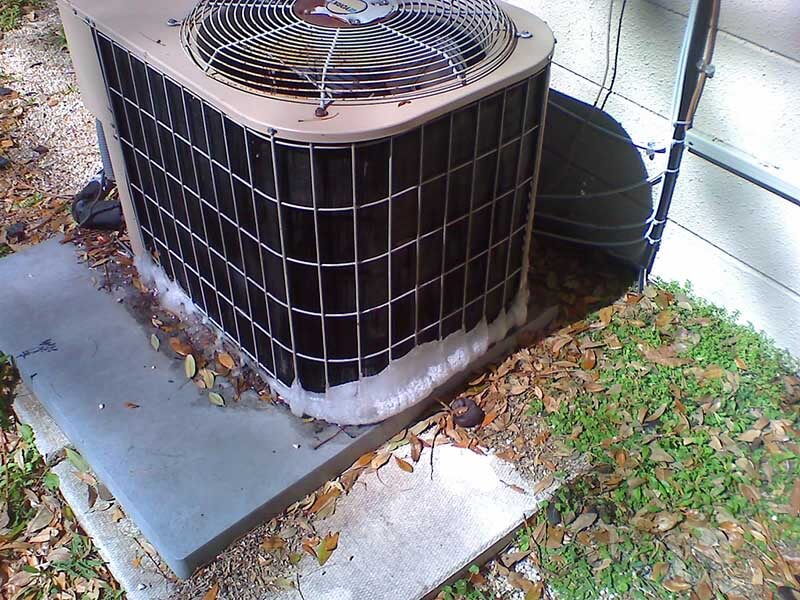
Your heat pump fan is covered in ice. What do you do? Do you panic? Worry about the compressor or some other expensive component?
Don’t worry – getting ice on your heat pump fan is a common issue that is relatively easy to resolve. There are plenty of effective methods that you can utilize if you need to get that ice off your heat pump fan so your system can keep running smoothly.
Continue reading to learn how to get ice off heat pump fan components.
If you’re looking for quality HVAC technicians in the Bentonville area, click the following link to find more information.
Ice Can Form On The Fan Of Your Heat Pump For A Variety Of Reasons
Here is a detailed guide that can help you learn how to get ice off heat pump fan components:
*Make sure that you’ve turned your heat pump fan off before attempting to make any repairs.*
Use A Broom To Gently Knock The Ice Off Of The Heat Pump Fan
When the heat pump fan stops working to its full potential, the heat pump will no longer be able to circulate air properly, and your home will not be heated or cooled properly. You can deal with this issue by using a broom to gently knock the ice off of the heat pump fan. You should also make sure that your heat pump is properly insulated and that there are no leaks in the ductwork.
Pour Warm Water Over The Ice On The Heat Pump Fan To Melt It
If you want to learn how to get ice off heat pump fan parts, you can try pouring warm water over the ice until it begins to melt. You can also use a hairdryer or a portable heater to melt the ice.
Just be sure not to overheat the coils, as this can damage them. Once the ice has melted, you can remove it with a brush or cloth. If you find yourself dealing with ice build-up on a regular basis, you may want to invest in an ice guard or similar product that will help prevent it from happening again in the future.
Turn On The Heat Pump Fan To Blow The Water Off
Next, you can try turning on the heat pump fan. Doing this will help to thaw out the ice and blow the water off of the fan.
Once the majority of the ice has melted off of the heat pump fan, you can use a brush to remove leftover debris from the fan. If you can’t figure out how to get ice off heat pump components, you can always contact a professional for assistance.
Use A Powerful Vacuum Cleaner With The Hose Attachment To Suck Up Any Remaining Water In The Heat Pump Fan
The last step you need to take if you want to get ice off your heat pump fan is to use a vacuum cleaner with the hose attachment. Doing this will suck up any remaining water in the heat pump fan and help to prevent ice from forming.
You should also make sure that the area around the heat pump is well ventilated so that the air can circulate properly.
Finally, you can try using a mixture of soap and water to break up the ice. This should be done carefully so that you don’t damage the heat pump fan.
Whichever method you choose, make sure that you turn off the power to the heat pump before you begin.

Call A Professional To Help Remove The Ice From Your Heat Pump Fan If Necessary
If you have an ice-covered heat pump fan, it’s important to call a professional to remove the ice. Trying to remove the ice yourself can damage the fan, and it can be dangerous if you don’t know what you’re doing.
A professional will have specialized HVAC tools and the experience to safely and effectively remove the ice. In most cases, they’ll use a high-quality heat gun to thaw the ice and then chisel it off. They may also use a power washer to remove any remaining ice.
Once the fan is clear of ice, they’ll check for any damage and make sure that it’s still in good working order. If everything looks good, they’ll reattach the fan and turn on your heat pump.
So, if you don’t feel comfortable removing the ice from your sump pump fan, you can always rely on your local HVAC technician.
Methods For Getting Ice Off Your Heat Pump Fan — Conclusion
There you have it – now you know how to get ice off of heat pump fans. If these methods don’t work or if the fan is damaged, contact a professional AC technician for assistance.
They are able to help you assess and repair AC issues so that you can continue to enjoy efficient heating during the winter months.


